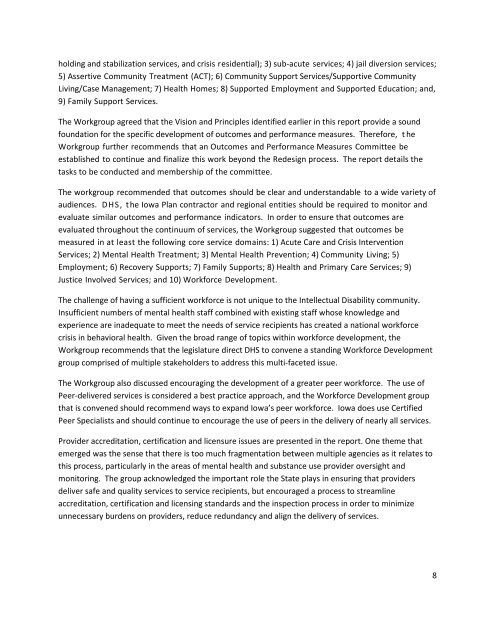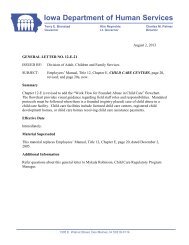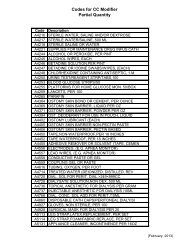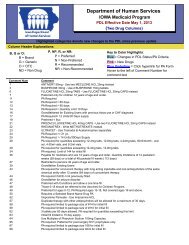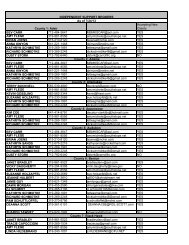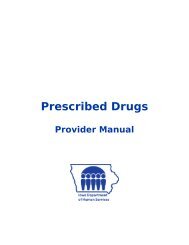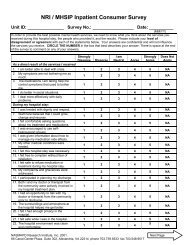Iowa Mental Health and Disability Services System Redesign Interim ...
Iowa Mental Health and Disability Services System Redesign Interim ...
Iowa Mental Health and Disability Services System Redesign Interim ...
- No tags were found...
Create successful ePaper yourself
Turn your PDF publications into a flip-book with our unique Google optimized e-Paper software.
holding <strong>and</strong> stabilization services, <strong>and</strong> crisis residential); 3) sub-acute services; 4) jail diversion services;<br />
5) Assertive Community Treatment (ACT); 6) Community Support <strong>Services</strong>/Supportive Community<br />
Living/Case Management; 7) <strong>Health</strong> Homes; 8) Supported Employment <strong>and</strong> Supported Education; <strong>and</strong>,<br />
9) Family Support <strong>Services</strong>.<br />
The Workgroup agreed that the Vision <strong>and</strong> Principles identified earlier in this report provide a sound<br />
foundation for the specific development of outcomes <strong>and</strong> performance measures. Therefore, t he<br />
Workgroup further recommends that an Outcomes <strong>and</strong> Performance Measures Committee be<br />
established to continue <strong>and</strong> finalize this work beyond the <strong>Redesign</strong> process. The report details the<br />
tasks to be conducted <strong>and</strong> membership of the committee.<br />
The workgroup recommended that outcomes should be clear <strong>and</strong> underst<strong>and</strong>able to a wide variety of<br />
audiences. DHS, the <strong>Iowa</strong> Plan contractor <strong>and</strong> regional entities should be required to monitor <strong>and</strong><br />
evaluate similar outcomes <strong>and</strong> performance indicators. In order to ensure that outcomes are<br />
evaluated throughout the continuum of services, the Workgroup suggested that outcomes be<br />
measured in at least the following core service domains: 1) Acute Care <strong>and</strong> Crisis Intervention<br />
<strong>Services</strong>; 2) <strong>Mental</strong> <strong>Health</strong> Treatment; 3) <strong>Mental</strong> <strong>Health</strong> Prevention; 4) Community Living; 5)<br />
Employment; 6) Recovery Supports; 7) Family Supports; 8) <strong>Health</strong> <strong>and</strong> Primary Care <strong>Services</strong>; 9)<br />
Justice Involved <strong>Services</strong>; <strong>and</strong> 10) Workforce Development.<br />
The challenge of having a sufficient workforce is not unique to the Intellectual <strong>Disability</strong> community.<br />
Insufficient numbers of mental health staff combined with existing staff whose knowledge <strong>and</strong><br />
experience are inadequate to meet the needs of service recipients has created a national workforce<br />
crisis in behavioral health. Given the broad range of topics within workforce development, the<br />
Workgroup recommends that the legislature direct DHS to convene a st<strong>and</strong>ing Workforce Development<br />
group comprised of multiple stakeholders to address this multi-faceted issue.<br />
The Workgroup also discussed encouraging the development of a greater peer workforce. The use of<br />
Peer-delivered services is considered a best practice approach, <strong>and</strong> the Workforce Development group<br />
that is convened should recommend ways to exp<strong>and</strong> <strong>Iowa</strong>’s peer workforce. <strong>Iowa</strong> does use Certified<br />
Peer Specialists <strong>and</strong> should continue to encourage the use of peers in the delivery of nearly all services.<br />
Provider accreditation, certification <strong>and</strong> licensure issues are presented in the report. One theme that<br />
emerged was the sense that there is too much fragmentation between multiple agencies as it relates to<br />
this process, particularly in the areas of mental health <strong>and</strong> substance use provider oversight <strong>and</strong><br />
monitoring. The group acknowledged the important role the State plays in ensuring that providers<br />
deliver safe <strong>and</strong> quality services to service recipients, but encouraged a process to streamline<br />
accreditation, certification <strong>and</strong> licensing st<strong>and</strong>ards <strong>and</strong> the inspection process in order to minimize<br />
unnecessary burdens on providers, reduce redundancy <strong>and</strong> align the delivery of services.<br />
8


